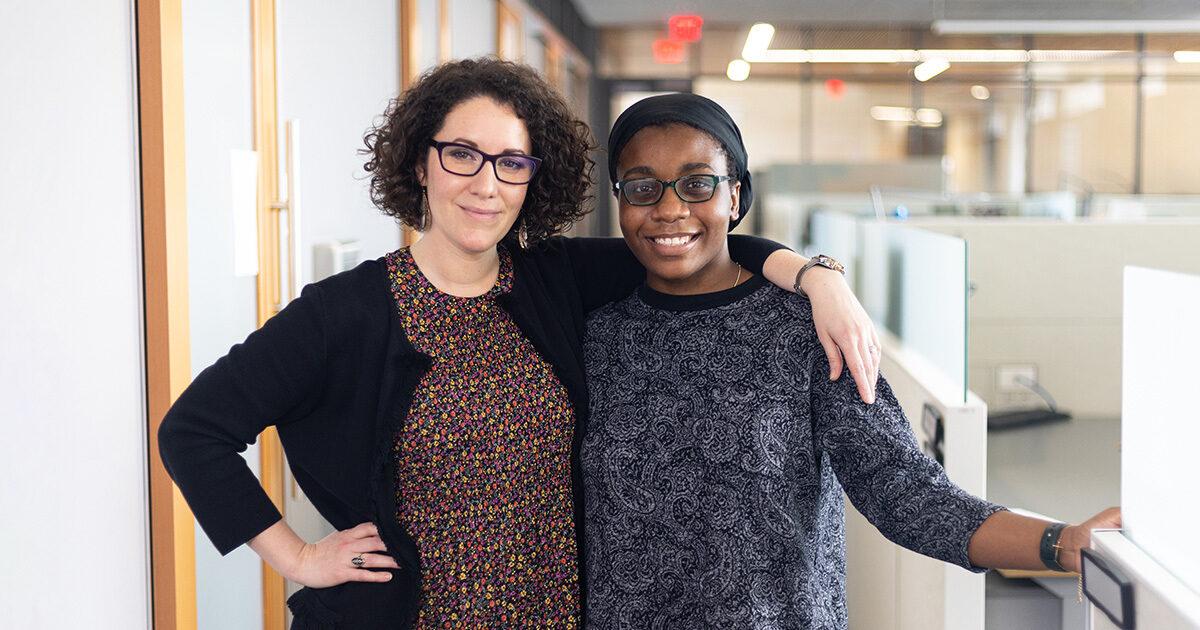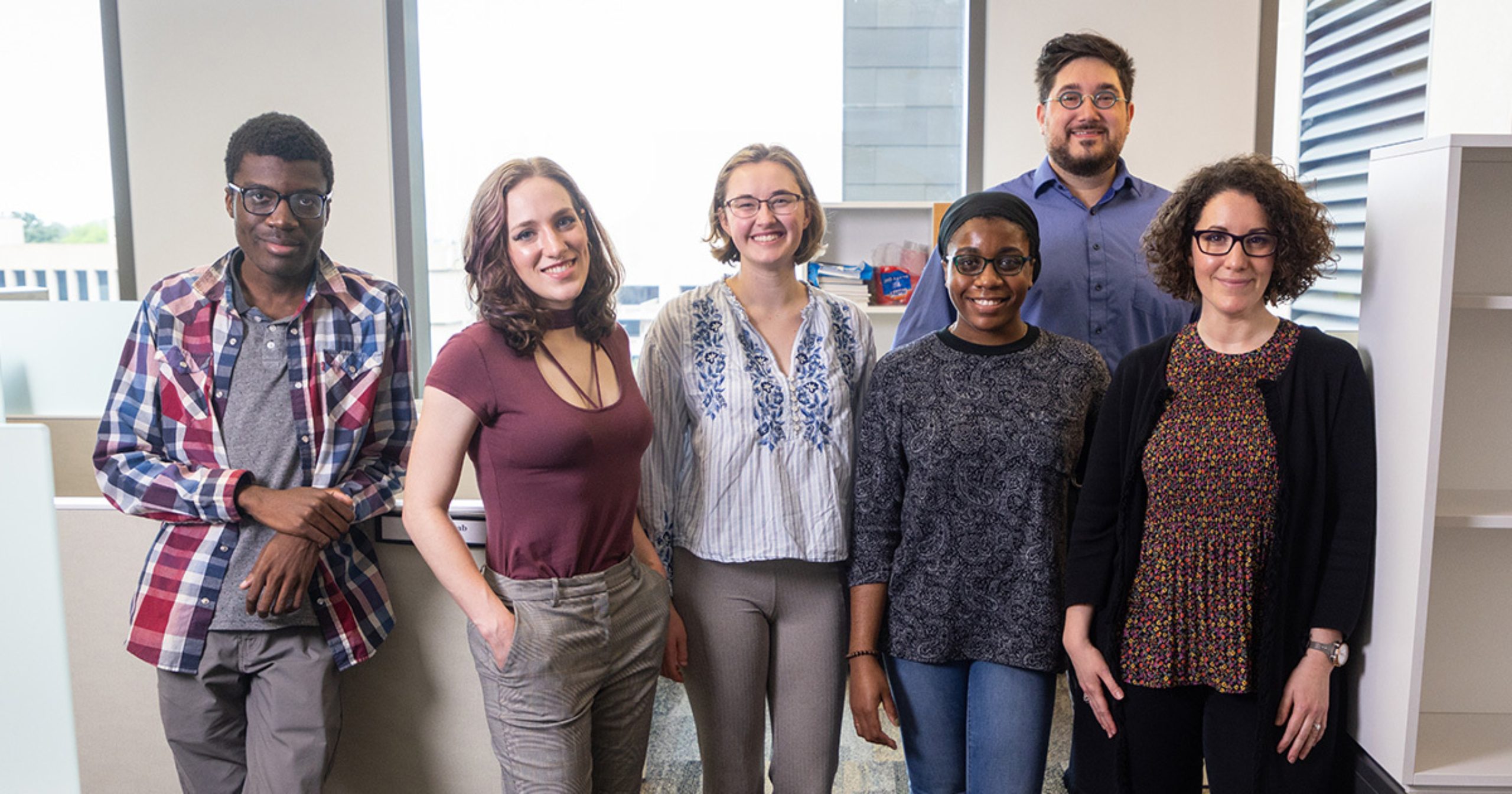Curiosity, Perspective, and Compassion
How one student’s curiosity led to the start of a career in medicine
Reviewed by: Léorah Freeman MD, PhD; Helen Onuorah
Written by: Gene Lazuta

Helen Onuorah, a 24-year-old Austinite and (now) medical student at The University of Texas Medical Branch Galveston, and Léorah Freeman MD, PhD, a board-certified neurologist in UT Health Austin’s Multiple Sclerosis and Neuroimmunology Center within the Mulva Clinic for the Neurosciences, came together after Helen sent an email inquiring about a potential position for herself in Dell Medical School Multiple Sclerosis Imaging and Outcomes Lab, for which Dr. Freeman serves as director. Helen, who received a BA in Neuroscience from the University of Pennsylvania in 2020, is fascinated by the complicated connection between human biology and behavior, at the personal level, and across society. Dr. Freeman, who earned both her medical degree and doctorate from Université Pierre et Marie Curie in Paris, France, was impressed with Helen’s email, and the two hit it off.
In her research, Dr. Freeman uses advanced imaging and clinical information to better understand and predict the long-term outcomes of people with multiple sclerosis (MS). As a new Research Engineering Scientist Assistant in Dr. Freeman’s laboratory, Helen was learning about how various medications are used to treat MS by reviewing the published results of a wide range of research trials conducted over the last couple of decades. As she worked her way through the literature, she noticed something.
“The goal of medical research, and particularly of clinical trials designed to study the potential impact and benefits of a new medication, is to improve the lives of people,” explains Helen. “So, it’s important that the investigators designing trials include the widest, most representative range of people in a study possible. But, when I looked at the global distribution of where these MS studies took place, I realized that they were mostly concentrated in what we call ‘the West,’ which is comprised of the United States, Canada, and Europe. That meant that people from South America, Africa, and large parts of Asia were not participating in this really important work. Consequently, I noticed that non-White people seemed to be largely underrepresented in these research trials. When I described what I found to Dr. Freeman, her immediate reaction was that we needed to bring this information forward, which is why we wrote our paper.”
In medicine, “peer-reviewed publications,” sometimes called simply “the literature,” is how doctors and scientists stay informed and up-to-date about advances in their field. Publications are expected to clearly explain an idea or concept and to show what work was done to validate the value of the paper’s conclusion or observation. Then, medical or scientific experts with experience and recognized credentials in a field examine the paper’s content to ensure that it achieves the high level of professional standards expected of published work. So, when “Enrollment of Non-White Participants and Reporting of Race and Ethnicity in Phase III Trials of Multiple Sclerosis DMTs: A Systematic Review,” written by Helen, Dr. Freeman, and six of their research colleagues, was published in the March 1, 2022 issue of the journal Neurology, for Helen, personally, it was a big deal.
“What we found,” shares Helen, “is that in the large phase 3 trials that supported the approval of MS medications between 1995 and 2020, non-White people were significantly underrepresented and also underreported in trial publications. Since our paper was published, I have had the opportunity to present our findings at a number of national medical conferences, and the discussions around our observations and ways in which studies can be designed and supported to address this historical reality in future work have been fantastic. How a study is designed helps determine how patients are recruited to participate, where studies are made available, and how a study is described and represented to different communities. By making inclusivity a goal, we will almost certainly enrich what these future studies will be able to reveal.”

Helen believes that the conversations the paper to which she contributed helped facilitate, the focus on inclusivity and representation in medical research and in medicine as a profession, the multidisciplinary team she joined in Dell Med’s Multiple Sclerosis Imaging and Outcomes Lab, and Dr. Freeman’s compassionate, relationship-based approach to caring for MS patients are all parts of a single, important theme.
“People do better when we work together,” says Helen. “The way the Dell Medical School teaches students is by bringing them together into teams right from the beginning. There is just so much to know, and medicine is changing so fast that working well with other people is more important than ever. I saw that in the lab, and it’s reflected in our paper. If we are going to help people make the best decisions about their health and health care, decisions that will best reflect who they are and what is right for them, understanding, inclusivity, empathy, and connection, are all crucial. It’s how we know to ask the questions that will make a difference. Speaking to people where they are, in ways they can understand given their own life experiences, whatever those experiences may be, is how we start building relationships that matter.”
“When Dr. Freeman cares for a patient with MS, you can just see the closeness, the connection,” continues Helen. “There’s a relationship that develops because of how she relates to each of her patients as a unique and complex individual, as a person. There’s a communication that happens, almost like a partnership. That’s very inspiring to me, and as I start my own journey as a clinician and as a scientist, it’s the kind of doctor I intend to be.”
For more information about the Multiple Sclerosis and Neuroimmunology Center within the Mulva Clinic for the Neurosciences or to schedule an appointment, visit here or call 1-833-UT-CARES (1-833-882-2737).